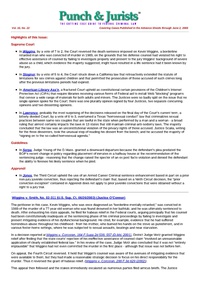Loaded on
June 1, 2003
published in Punch and Jurists
June 02, 2003
On December 20, 2002, the Bureau of Prisons (BOP) sent a memorandum to all Federal judges in which it announced a “significant procedure change” regarding inmate designations to community correction centers (CCCs) (also known as “halfway houses”). “Effective immediately,” the directive announced, the BOP would no longer follow its …
Loaded on
June 1, 2003
published in Punch and Jurists
June 02, 2003
Here the Court reversed a downward departure of four levels based on family responsibilities that was granted to a defendant who was convicted of multiple counts of making false statements to a financial institution. The district court granted the departure after concluding that the defendant was “the primary caregiver …
Loaded on
June 1, 2003
published in Punch and Jurists
June 02, 2003
The petitioner in this case, Kevin Wiggins, who was once diagnosed as “borderline mentally retarded,” was convicted in 1989 of the murder of a 77 year-old woman who was found drowned in her bathtub; and he was ultimately sentenced to death. After exhausting his state appeals, he filed for …
Loaded on
June 1, 2003
published in Punch and Jurists
June 02, 2003
Ever since it was enacted by Congress in 2000, various provisions of the Children’s Internet Protection Act (CIPA) (Pub.L.No. 106-554) have been under attack. Among its many provisions, CIPA requires that libraries in the U.S., in order to receive various forms of Federal funds that are critical to their …
Loaded on
June 1, 2003
published in Punch and Jurists
June 02, 2003
In a sweeping decision that effectively overturns similar criminal anti-sodomy laws in 13 states, the Supreme Court, by a surprising vote of 6 to 3, overturned a Texas "homosexual conduct" law that criminalizes sexual practices between same-sex couples that are lawful in the state when performed by a man …
Loaded on
June 1, 2003
published in Punch and Jurists
June 02, 2003
The defendant, a credit counselor in the credit repair business, pled guilty to conspiracy to distribute methamphetamine. Among the nine special conditions of supervised release recommended by the probation department were two restrictions on the defendant’s employment in any business involving the collection of personal financial information from clients. …
Loaded on
June 1, 2003
published in Punch and Jurists
June 02, 2003
Here, joining ten other Circuits, the Third Circuit held that Apprendi does not apply retroactively to cases on collateral appeal. The other ten Circuits (and the decisions that so held) are: Love v. Menifee, No. 01-2192 (2nd Cir. 06/13/2003); Sepulveda v. United States, No. 01-2755 (1st Cir. 05/29/2003); United …
Loaded on
June 1, 2003
published in Punch and Jurists
June 02, 2003
Here, in a case of first impression, the Third Circuit considered whether a prior non-jury juvenile adjudication can count as a prior conviction that qualifies as one of the predicate offenses required for a sentence enhancement under the Armed Career Criminal Act (ACCA) (18 U.S.C. § 924(e)).
In this …
Loaded on
June 1, 2003
published in Punch and Jurists
June 02, 2003
The petitioners in these three consolicated cases sought habeas relief pursuant to 28 U.S.C. § 2255 based on the Bureau of Prison's (BOP) change in policy that ended its long practice of placing inmates in halfway houses (CCCs) to serve short terms of imprisonment.
Each of the three petitioners …
Loaded on
June 1, 2003
published in Punch and Jurists
June 02, 2003
Here the en banc Court held that the transport of drugs on a nonstop flight from one location in the U.S. to another does not constitute importation within the meaning of 21 U.S.C. § 952(a) - even though the flight traveled in international airspace. Accordingly, all importation related drug …
Loaded on
June 1, 2003
published in Punch and Jurists
June 02, 2003
Until 1993, most sex crimes in California were governed by a general three-year statute of limitations, which meant that they could not be prosecuted once three years had elapsed. Pressured by the rising incidence and notoriety of child sex abuse crimes, the California legislature changed the law that year …
